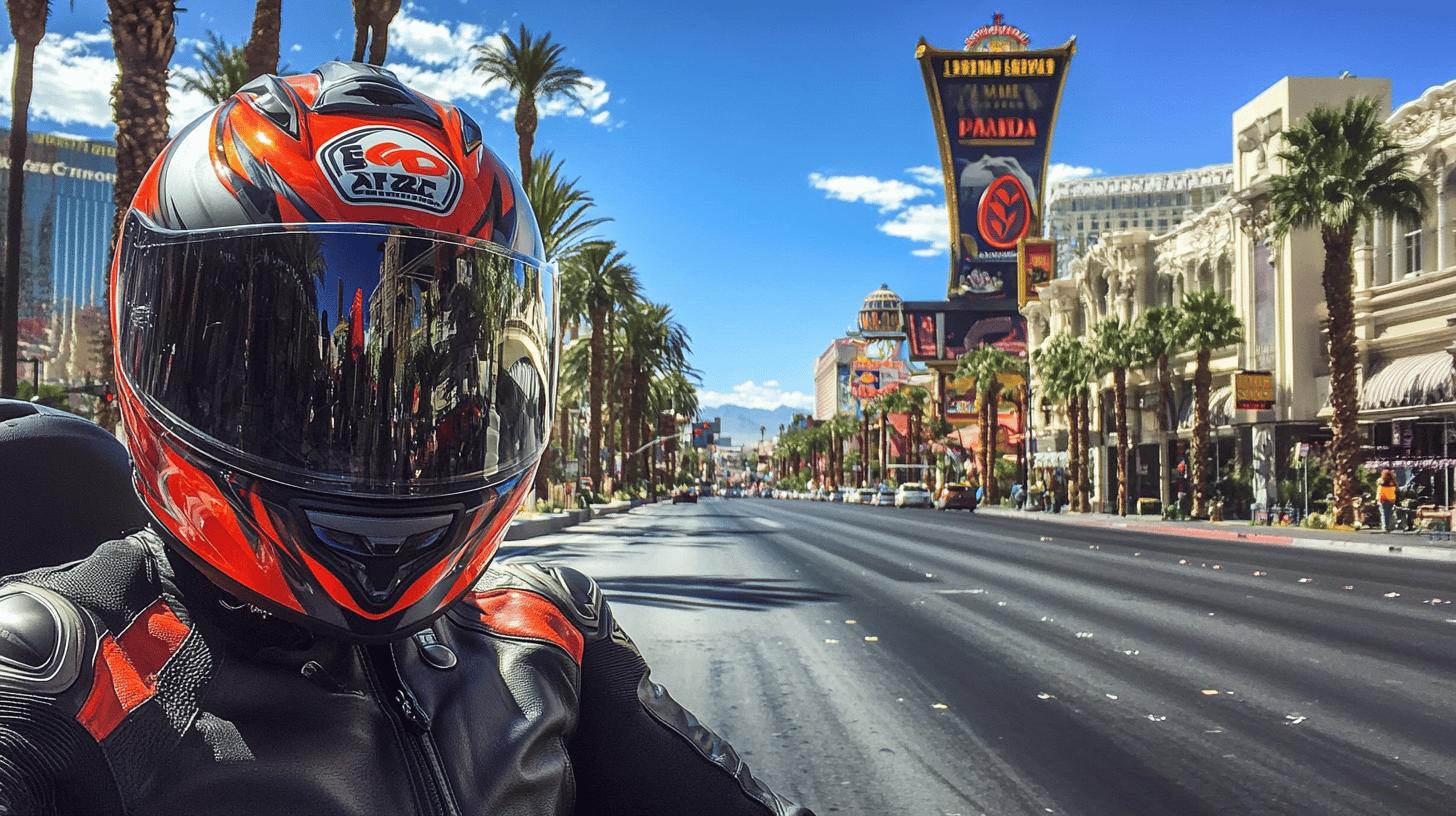Is ensuring safety worth a minor misdemeanor? In Las Vegas, riding without a helmet is not merely a personal choice but a legal obligation. Nevada's motorcycle helmet law mandates that every motorcyclist and passenger, regardless of vehicle type, wear helmets that comply with U.S.
Department of Transportation standards. Violating this essential safety law incurs fines and demerit points. Understanding the specific requirements and implications of these regulations is vital for motorcyclists in Las Vegas to avoid penalties and enhance safety.
Dive into our comprehensive guide to learn about Nevada's helmet laws and stay compliant.
Understanding Las Vegas Motorcycle Helmet Laws

Nevada's motorcycle helmet law requires that all motorcycle operators and passengers in Las Vegas, regardless of vehicle type, wear helmets that comply with U.S. Department of Transportation (DoT) standards. This regulation extends to riders on trikes and mopeds, highlighting a universal commitment to safety.
The DoT certification ensures that helmets meet specific safety criteria designed to protect riders from head injuries in the event of an accident. By adhering to these standards, Nevada aims to reduce the number of fatalities and serious injuries resulting from motorcycle incidents.
-
Helmets must weigh a minimum of three pounds.
-
An inner polystyrene foam lining of at least one inch is mandatory.
-
Sturdy chin straps with secure rivets are required.
-
Helmets must be DoT-certified.
-
Helmets should be replaced every five years or seven years from the manufacturing date.
Failure to comply with these helmet laws is considered a misdemeanor in Las Vegas, carrying significant legal consequences. Riders caught without a helmet may face fines, with the standard penalty in Las Vegas being $205. Additionally, two demerit points are added to the rider's license for each violation.
These points can accumulate, leading to more severe penalties, such as license suspension, if 12 points are accrued within a year. The enforcement of these laws emphasizes the importance of helmet use not only for legal compliance but also for the critical protection it provides against life-threatening injuries.
Helmet Law Compliance and Penalties in Nevada

Violations of motorcycle helmet laws in Nevada are classified as misdemeanors. Riders caught without a helmet in Las Vegas face a fine of $205. This classification underscores the seriousness with which Nevada enforces helmet compliance, emphasizing the state's commitment to rider safety and legal adherence.
Demerit points are a significant consequence of non-compliance. Each helmet violation adds two demerit points to a rider's license. Accumulating 12 points within a year can result in a six-month suspension of the rider's license. This point system aims to deter repeated offenses by imposing escalating penalties for continued non-compliance, thereby promoting consistent adherence to helmet laws.
Options exist for reducing penalties or negotiating charges. Riders with a clean driving record may negotiate to reduce a helmet violation to a non-moving violation or potentially have it dismissed. Legal representation can be beneficial in navigating these options, offering strategies to mitigate the impact of penalties on a rider's driving record and future licensing status.
Exemptions and Special Cases in Helmet Regulations

Are there any exemptions to Nevada's motorcycle helmet laws? Yes, operators of three-wheeled vehicles with enclosed cabs are exempt from the helmet requirement. This exemption recognizes the protective nature of enclosed cabs, which offer a level of safety similar to that of a car, thus reducing the necessity for a helmet.
-
Operators of fully enclosed three-wheeled vehicles do not need helmets.
-
Riders in organized parades may be granted temporary helmet exemptions.
-
Certain historical or vintage vehicle events might have specific exemptions.
Despite these exceptions, Nevada's helmet laws broadly apply to all motorcycle riders and passengers, irrespective of age. This comprehensive mandate underscores the state's commitment to ensuring maximum safety on its roads.
Helmets are crucial for reducing the risk of serious injury in the event of an accident, making compliance with these laws essential for all who ride motorcycles or similar vehicles.
Importance of Helmet Use for Rider Safety

Motorcycle helmets are paramount in reducing the risk of severe head injuries during crashes. Statistically, motorcycle-related accidents are 28 times more likely to result in fatality compared to other vehicle incidents, underscoring the necessity of protective headgear.
Helmets are engineered with advanced safety features that provide critical protection, absorbing impact forces and minimizing head trauma. This reduction in injury risk not only saves lives but also decreases the long-term health consequences that can arise from motorcycle accidents.
-
Impact Absorption: Helmets are designed to absorb the energy of an impact, reducing the force transmitted to the skull.
-
Cranial Protection: The outer shell and inner foam lining work together to shield the head from direct blows and penetration.
-
Stability and Comfort: Secure chin straps and a snug fit prevent helmet displacement during a crash, maintaining optimal protection.
-
Visibility and Awareness: Modern helmets are designed to enhance rider visibility without compromising the ability to hear surrounding traffic.
-
Weather Resistance: Helmets provide protection against elements such as wind, rain, and debris, improving rider focus and safety.
The broader implications of helmet use extend beyond individual safety. By wearing a helmet, riders contribute to public safety efforts, reducing the burden on emergency services and healthcare systems. Helmets decrease the likelihood of severe injuries, which in turn can lead to fewer fatalities and less strain on medical resources.
Encouraging widespread helmet use is a crucial step in accident prevention and enhances overall road safety, benefiting both motorcyclists and the general public.
Staying Updated on Las Vegas Helmet Law Changes

Do Las Vegas motorcycle helmet laws change frequently? Yes, helmet laws can undergo updates, impacting enforcement and compliance. Staying informed is crucial for riders to maintain legal adherence and safety standards.
Changes may include adjustments to certification requirements, penalties, or specific exemptions. By understanding these updates, riders can avoid fines and ensure they are adequately protected.
-
Local DMV Updates: Regularly check the Nevada DMV website for official announcements regarding traffic law changes.
-
Rider Advocacy Groups: Join local motorcycle clubs or groups that focus on legislative issues and rider safety.
-
Legal News Outlets: Subscribe to newsletters or alerts from legal firms specializing in traffic laws for current information.
- Community Meetings: Attend town hall meetings where local traffic laws and updates are discussed, offering direct insights from lawmakers.
Why is proactive awareness important for motorcyclists? Engaging in community discussions and staying informed helps riders anticipate changes and adapt accordingly.
This proactive approach not only aids in compliance but also fosters a safer riding environment by encouraging dialogue between riders and legislators. By participating in these discussions, riders can contribute to shaping laws that best serve their interests and safety on the road.
Final Words
Understanding Las Vegas motorcycle helmet laws ensures legal compliance and enhances safety. Nevada's mandated helmet use protects riders and passengers, reducing the risk of severe injuries.
Non-compliance carries fines and license penalties, reinforcing the importance of adherence. Awareness of exemptions and ongoing law updates keeps riders informed and compliant.
Prioritizing helmet use and staying updated on legislation provide a better riding experience and improve safety on the roads.
FAQ
How much is a no helmet ticket in Nevada?
A no helmet ticket in Nevada costs $205 and adds two demerit points to the rider's license, classifying the violation as a misdemeanor.
Are half helmets legal in Nevada?
Half helmets are legal in Nevada if they meet U.S. Department of Transportation safety standards, which include requirements for safety features like weight and lining.
What states allow you to ride a motorcycle without a helmet?
States that allow riding without a helmet include Illinois, Iowa, and New Hampshire. However, riders should verify these conditions as laws may change.
What is the 5-year rule for motorcycle helmets?
The 5-year rule for motorcycle helmets suggests replacing them every five years due to wear and tear that could compromise safety features, even if there are no visible damages.
Do motorcycle helmet laws apply to all ages in Nevada?
In Nevada, motorcycle helmet laws apply to riders and passengers of all ages to ensure consistent safety measures, with no age-based exemptions.

Brad Mitchell is a seasoned motorcycle enthusiast with over 16 years of riding experience. He’s spent countless hours on the open road, particularly favoring scenic routes aboard his trusted Harley-Davidson. Brad’s laid-back approach to life and riding gives him a unique perspective on motorcycle gear and safety, which he shares through his in-depth reviews and expert advice on ProtectiveGearz.



